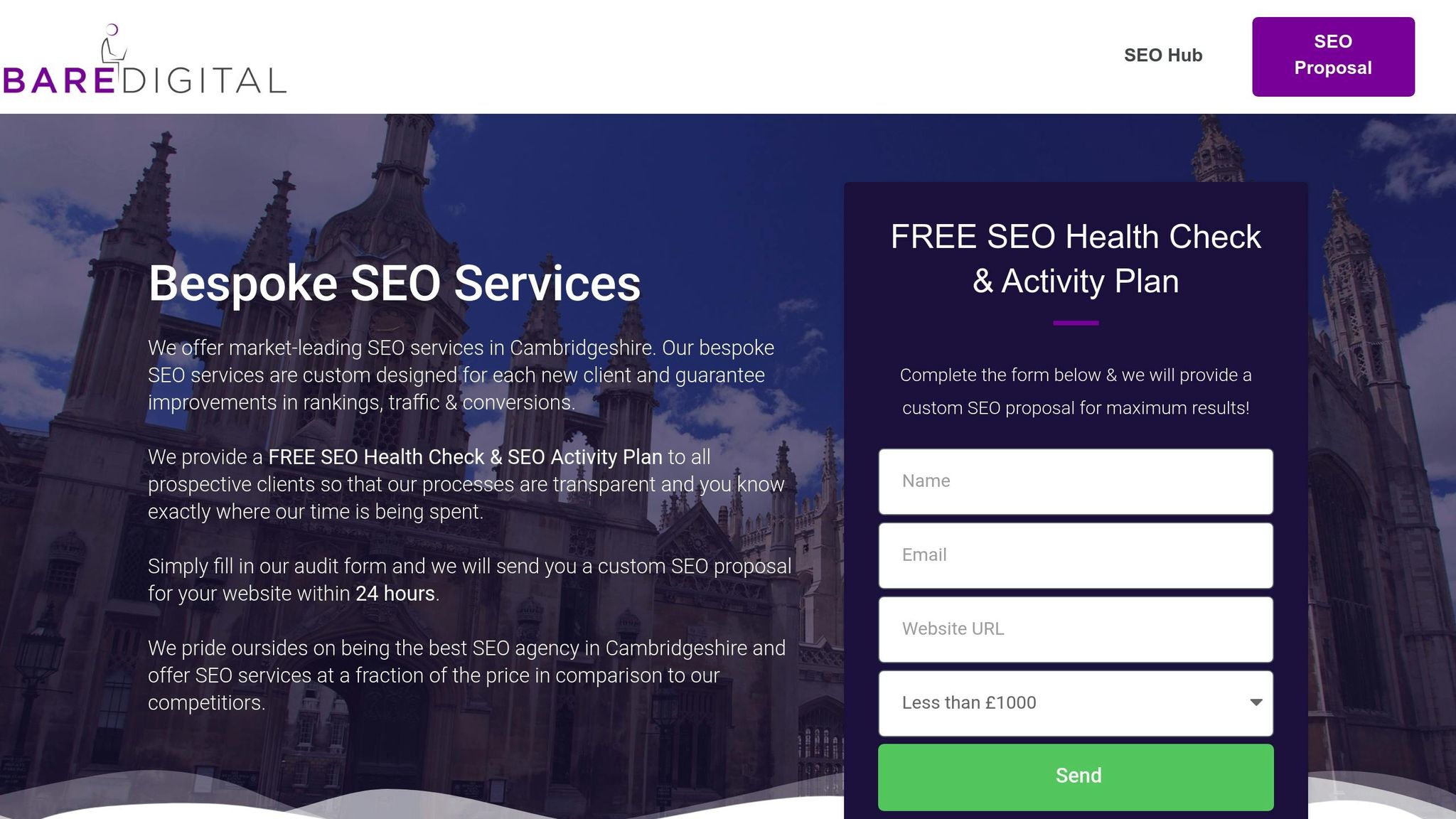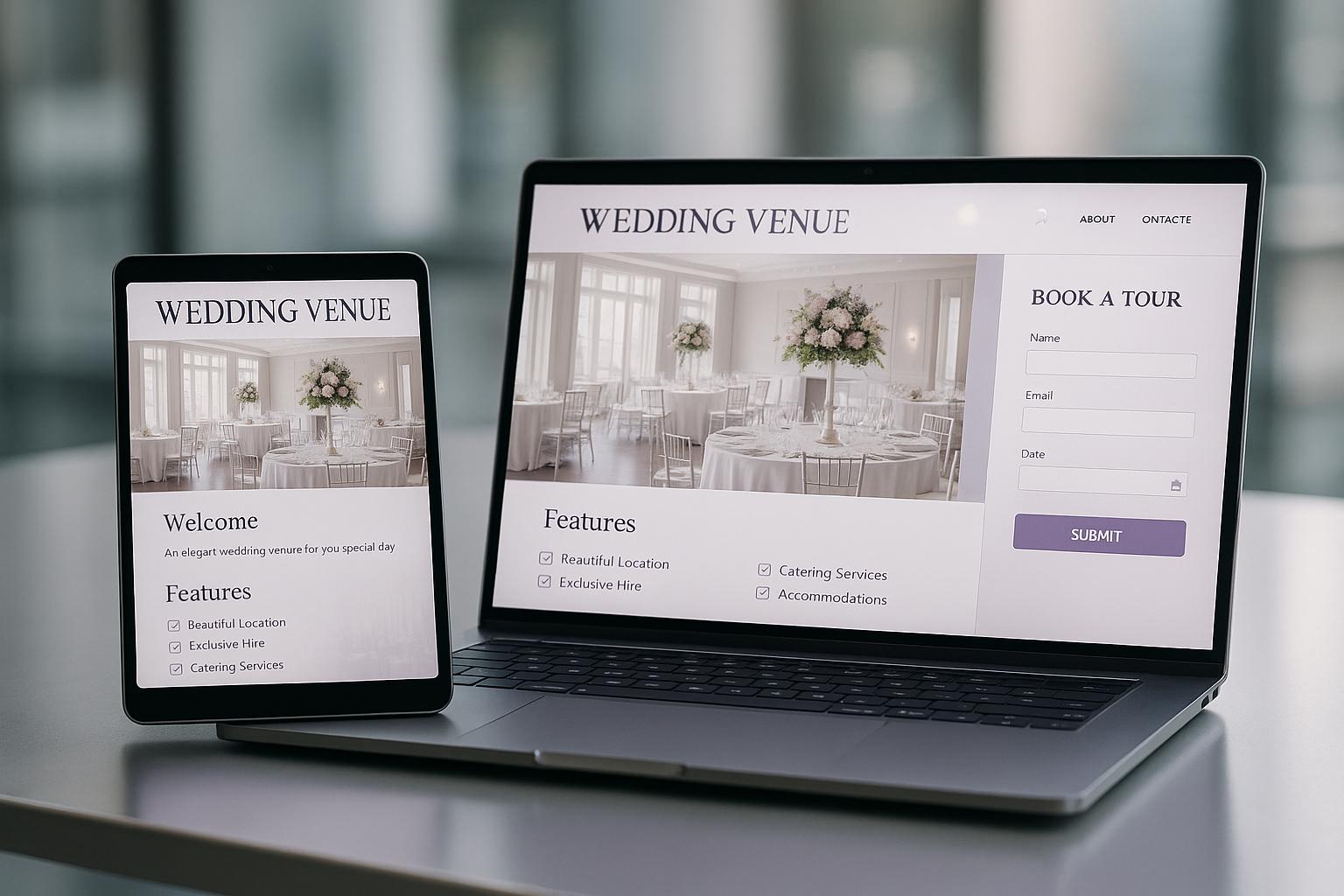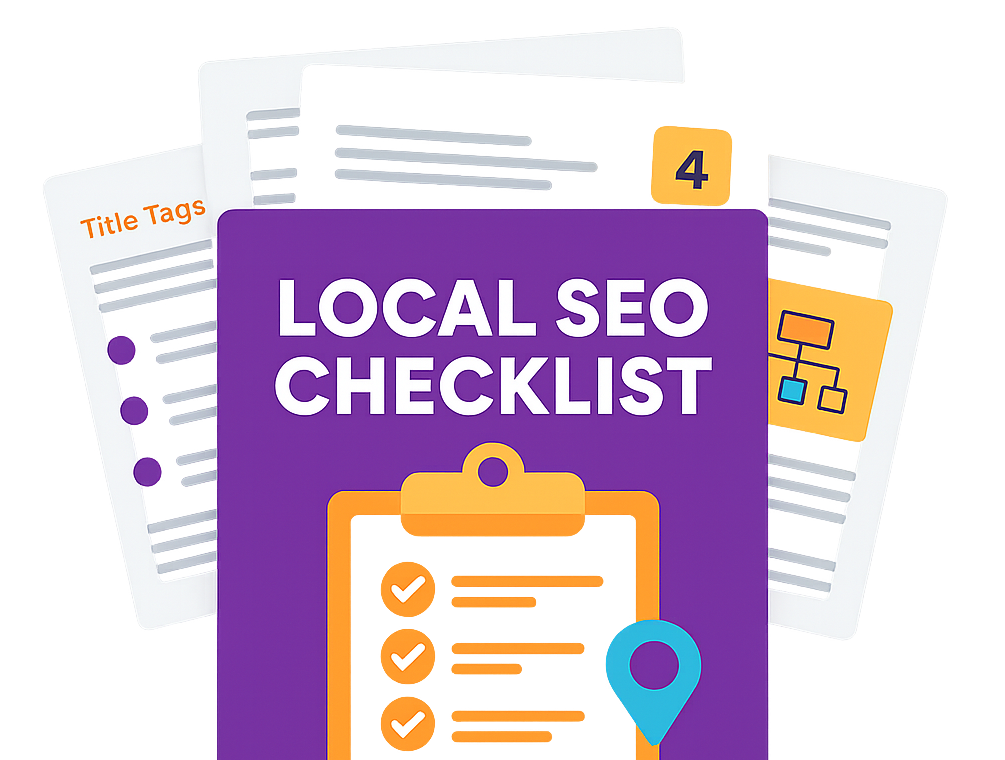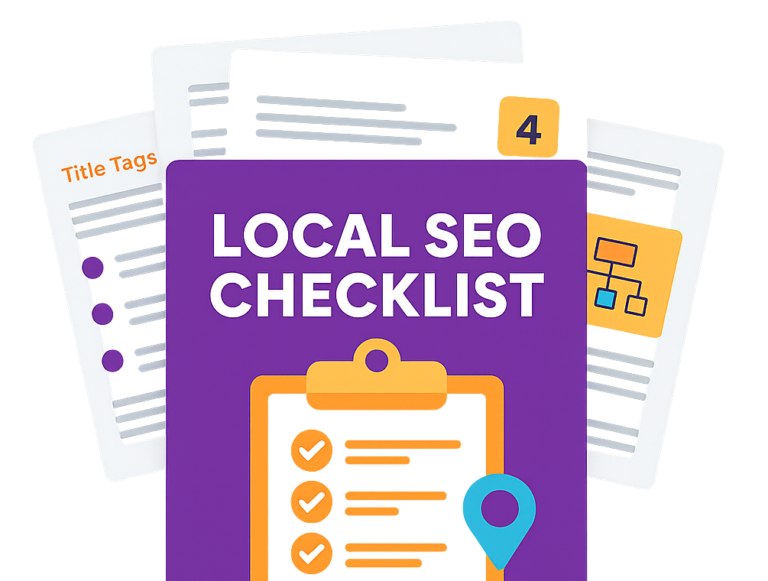Want more bookings for your wedding venue? Start with SEO. With 78% of couples beginning their venue search online (and 73% doing it on mobile), showing up in search results is critical. This guide simplifies everything you need to know about optimizing your website, boosting local visibility, and staying ahead of competitors.
Key Takeaways:
- Keyword Strategy: Focus on terms like "wedding venues near me" or "outdoor wedding venues [city]." Long-tail keywords (e.g., "affordable barn wedding venue in Austin") can drive more targeted traffic.
- Mobile Optimization: With over half of web traffic from mobile, ensure fast load times, responsive design, and easy navigation.
- Local SEO: Update your Google Business Profile with accurate details, photos, and reviews. Consistent NAP (Name, Address, Phone) data across platforms builds trust.
- Technical SEO: Improve site speed, use schema markup for rich snippets, and fix broken links to enhance rankings.
- Content Updates: Regularly refresh galleries, testimonials, and blog posts to stay relevant.
- Backlinks: Partner with local vendors and wedding blogs to earn quality links that boost credibility.
Whether you’re targeting "micro weddings" or large events, this checklist ensures your venue gets found online when couples are searching. SEO isn’t just about rankings – it’s about turning searches into bookings.
The Best SEO Strategies for Wedding Venues | The Venue RX
On-Page SEO for Wedding Venues
Fine-tuning your on-page SEO ensures that search engines and couples can quickly grasp what your venue has to offer. With over 550,000 online searches for wedding venues in the U.S. every month, nailing these basics could be the difference between standing out or being overlooked.
Keyword Research for Wedding Venues
The foundation of effective SEO is understanding how couples search for venues. Keywords with high intent – search terms used by people ready to take action, like booking – are your best bet. These phrases typically lead to more conversions compared to informational keywords, which often attract casual browsers.
A great starting point is Google’s autocomplete. Type in seed phrases like "wedding venue" or "wedding reception", and see what suggestions pop up. These can reveal common search habits and variations.
Take a close look at your Google Business Profile to spot high-conversion keywords. Also, analyze your competitors’ location pages. Reviewing their headings, meta descriptions, and content themes might uncover keyword opportunities you’ve missed.
| Keyword | Avg. Monthly Searches | Competition |
|---|---|---|
| wedding venues near me | 368,000 | Low |
| wedding reception near me | 368,000 | Low |
| barn wedding venues near me | 27,100 | Low |
| small wedding venues near me | 14,800 | Low |
| all inclusive wedding venues | 8,100 | Medium |
Long-tail keywords are especially valuable. These are detailed phrases like "rustic barn wedding venue in Austin Texas" or "affordable outdoor wedding venues near downtown Chicago." They tend to have less competition and align well with voice searches. You can also find keyword inspiration in online forums, Reddit threads, or local Facebook groups where couples discuss their venue searches.
Once you’ve pinpointed the right keywords, you can use them to create engaging meta tags and structured content in the next phase.
Optimizing Meta Tags, Headings, and Content
Meta tags and headings play a huge role in how couples find your venue online. With the top result on Google earning 28% of clicks and 75% of users not going past the first page, these elements need to be both eye-catching and optimized.
Start with your page titles. Include your main keyword and location within 60 characters, like "Rustic Barn Wedding Venue in Nashville | [Venue Name]." This approach targets both style preferences and location-specific searches.
Meta descriptions should expand on the title, highlighting what makes your venue special. Include details like capacity, unique features, or package options, while keeping it under 160 characters. Use natural language to make it appealing.
Your heading structure (H1, H2, H3) helps search engines understand your content. Use your primary keyword in the H1 tag, and craft H2s to address related terms. For example, if your focus is "outdoor wedding venue", H2 headings could include "Garden Ceremony Spaces" or "Reception Pavilion Options."
Content should match the intent behind the search. For example, if someone searches "wedding venue pricing", they’re looking for clear cost details. On the other hand, "wedding venue photos" calls for a visual gallery. Integrate your keywords naturally to maintain readability and flow.
Once your text elements are optimized, focus on visuals and mobile usability to keep visitors engaged.
Image and Mobile Optimization
With 55% of global website traffic coming from mobile devices and 74% of users preferring mobile-friendly sites, a seamless mobile experience is essential – not just for SEO but also for converting visitors into bookings.
Start by optimizing your images. Compress files to reduce load times without sacrificing quality, as slow-loading websites drive away users – 53% of mobile users abandon sites that take more than three seconds to load. Use descriptive filenames like "rustic-barn-wedding-ceremony-nashville.jpg" and include relevant keywords in your alt tags, such as "Outdoor wedding setup with string lights at [Venue Name] in [City]."
To speed things up, implement lazy loading for images below the fold. Also, ensure your website uses a responsive design, so it looks great on smartphones, tablets, and desktops. This includes flexible layouts and images that adjust to different screen sizes.
Make navigation easy for mobile users by limiting your main menu to 4-8 key sections and using a touch-friendly menu design. Optimize forms by reducing the number of required fields and enabling autofill to simplify the process.
For touch targets like buttons and links, aim for a size of at least 44×44 pixels, and set text size to a minimum of 16px for readability on smaller screens. Use tools like Google’s Mobile-Friendly Test and PageSpeed Insights to ensure your site performs well across devices.
Mobile-friendly websites don’t just improve user experience – they can also lead to a 67% increase in purchase likelihood. In fact, 68% of companies reported higher sales after prioritizing mobile-first design.
For more tips on boosting your wedding venue’s online visibility, check out our SEO for Wedding Venues guide.
Technical SEO and Site Health
Technical SEO is the backbone of your wedding venue website, ensuring it performs well, stays secure, and is structured properly. Search engines pay close attention to these factors, and getting them right can have a big impact on both your search rankings and how users experience your site.
Improving Site Speed
Your website’s speed plays a crucial role in both search rankings and converting visitors into bookings. Google recommends a loading time of under 2.5 seconds, and 53% of mobile users will leave if a site takes more than three seconds to load.
To check your site speed, use tools like Google PageSpeed Insights, GTmetrix, or WebPageTest. These can pinpoint what’s slowing your site down and offer actionable tips. Pay special attention to Google’s Core Web Vitals, which focus on real user experience through three main metrics:
| Metric | Good | Poor |
|---|---|---|
| Largest Contentful Paint | ≤2,500ms | >4,000ms |
| First Input Delay | ≤100ms | >300ms |
| Cumulative Layout Shift | ≤0.1 | >0.25 |
Since wedding venues often showcase high-resolution photos, optimizing images is essential. Compress images and use the fetchpriority="high" attribute for key visuals like hero images to load them faster.
"The first step to loading any website is downloading the HTML document from the server. Improving initial server response time is important, as other resources can’t start loading until after the HTML has loaded."
- DebugBear
Boost performance further by optimizing your server setup. This might involve upgrading to better hosting, fine-tuning database queries, or using a Content Delivery Network (CDN) to deliver content from servers closer to your users. Enable GZIP compression and set proper cache-control headers to shrink file sizes and speed up loading times.
Other speed tips include minifying and combining CSS/JavaScript files, deferring non-critical scripts, preloading essential resources, and using font-display: swap to ensure text is visible while custom fonts load.
Once speed is optimized, shift focus to fixing errors and improving security to maintain trust and boost rankings.
Fixing Errors and Security
Site errors and security issues can damage both your rankings and your visitors’ trust. Start by addressing broken links, redirect chains, and duplicate content. Ensure every page has a unique meta description and title.
Redirect chains and loops waste valuable crawl budget and slow down your site. Fix these by ensuring each redirect points directly to the final destination. For duplicate content, either rewrite it uniquely for each page or use canonical tags to indicate the original version to search engines.
Make sure your site is mobile-friendly by including a proper viewport tag.
Security is equally important. Protect your site with HTTPS and valid SSL/TLS certificates, which not only improve rankings but also reassure visitors sharing personal details. Strengthen passwords, keep software updated, limit access to sensitive areas, and consider implementing a web application firewall (WAF) for extra protection.
Regularly back up your site and have a recovery plan in place to safeguard against data loss. Use a version control system to track changes and employ input validation to prevent vulnerabilities.
Using Schema Markup
Once your site’s speed and security are in good shape, it’s time to implement schema markup to boost search visibility. Schema markup helps search engines better understand your site’s content and can lead to rich snippets that make your listing stand out. Use structured data to highlight key details like location, pricing, capacity, amenities, and customer reviews directly in search results.
Start with LocalBusiness schema to include your venue’s name, address, phone number, and operating hours. Add Event schema to showcase details for weddings and receptions, such as capacity, catering options, and pricing ranges. Use Review schema to display star ratings and testimonials. You can also incorporate Place schema for geographic coordinates, parking, and accessibility features, along with Offer schema to promote package deals or special pricing for off-peak dates.
Validate your schema markup using Google’s Structured Data Testing Tool to ensure it works correctly. Focus on the details couples care about most – like location, availability, pricing, and reviews – to increase your chances of appearing in rich snippets.
For more technical SEO tips, check out our full guide on SEO for Wedding Venues.
Local SEO for Wedding Venues
Local SEO helps your wedding venue stand out in location-based searches like "wedding venues near me" or "outdoor wedding venues in [your city]." It’s all about connecting with couples searching for venues nearby. And it matters – a lot. 73% of users lose trust in a business if their listing has incorrect information, and most couples prefer venues within a convenient distance from their home or ceremony location.
Google My Business Optimization
Your Google Business Profile (GBP) often serves as the first impression for couples researching venues, so making it shine is key. Start by claiming or creating your profile through Google Maps or the Google Business Profile homepage.
Complete every detail: venue name, contact info, website, social media links, service areas, and business hours. Craft a concise, engaging description (under 750 characters) that highlights what makes your venue special. Sprinkle in keywords like "wedding venue", "reception hall", or "outdoor ceremonies" to help your listing rank higher.
Choose the right categories to broaden your visibility. Primary categories could include "Wedding Venue" or "Event Venue", while secondary ones might reflect additional services you offer.
Visuals are a game-changer. Upload high-quality photos and videos of your venue, showcasing different setups, seasons, and lighting. Couples want to imagine their day, so the more you can help them visualize, the better.
Use Google Posts to share updates like seasonal promotions, wedding showcases, or behind-the-scenes content. Enable the Google Q&A feature to address common questions about pricing, capacity, or availability. You can also activate Google Messages to allow couples to contact you directly – and respond quickly to inquiries.
Keep tabs on your GBP performance through the "Performance" tab. Analyze search queries, interactions, and booking requests. Check out competitors’ profiles, too, to see what they’re doing well and where you can improve.
"Everyone is looking at what’s online, so the more that you put out there and the more you stand out, the more chances you have to reach potential clients." – Lindsey Rendon, Senior Sales Manager, El Chorro
Next up: build your local credibility with backlinks and reviews.
Building Local Backlinks and Reviews
Strong backlinks and glowing reviews work hand-in-hand to boost your venue’s online reputation and search rankings. Start by connecting with others in your local wedding industry – photographers, florists, caterers, and planners – to create cross-promotional content. This can lead to backlinks from their websites and blogs.
Attend bridal shows and local events to network and earn mentions on prominent platforms. Submit your venue to directories like WeddingWire, The Knot, or local chamber of commerce sites. Engage actively on these platforms by answering questions and sharing advice to further establish your expertise.
Collaborate with local wedding bloggers and influencers to feature real weddings at your venue. These partnerships often result in detailed blog posts with backlinks to your site, plus a boost in social media visibility.
Reviews are equally critical. Positive feedback not only improves your local search rankings but also builds trust with potential clients. Encourage happy couples to leave reviews on platforms like Google, WeddingWire, or The Knot. Make it easy for them by sending follow-up emails with direct links to review pages. Always respond to reviews – thank couples for their kind words and address any concerns professionally.
Use SEO tools to monitor your backlinks and citations, ensuring accuracy and identifying new link-building opportunities. If your venue is mentioned without a link, reach out and request one – it’s a simple way to strengthen your online presence.
NAP Consistency
Consistency in your Name, Address, and Phone number (NAP) across all platforms is a cornerstone of local SEO. Inconsistent NAP data can confuse search engines and potential clients, harming both your rankings and your credibility. 63% of potential customers won’t reach out if they encounter conflicting contact information.
Audit your online presence to spot any discrepancies. Pay attention to details like abbreviations, suite numbers, or phone formats. For example, if your address is "123 Main Street, Suite 200", stick with that exact format instead of switching between "123 Main St., #200" or "123 Main Street, Ste 200."
Display your consistent NAP details prominently on your website – ideally in the header or footer – and use schema markup to help search engines interpret your contact information accurately.
Regularly check directories like Yelp, Bing Places, and Yellow Pages to ensure your NAP details are correct. Update your information immediately if you change your phone number, move locations, or modify your business name. Tools like BrightLocal Citation Tracker or Whitespark Citation Finder can help you identify inconsistencies and track your progress.
Keeping your NAP consistent isn’t just about accuracy – it’s about building trust. When couples can easily find and contact you, it increases the chances they’ll choose your venue for their big day.
For more tailored tips, check out Bare Digital’s SEO for Wedding Venues.
Building Authority with Off-Page SEO
Once your website and local presence are optimized, the next step is off-page SEO. This approach strengthens your venue’s online reputation and signals search engines that your site is credible. Backlinks from trusted sources play a huge role here, boosting your Google ranking and helping your venue stand out.
And the stakes are high. 78% of couples with luxury budgets find their vendors on Google. Plus, Google’s own documents confirm that “links continue to play a central role in Google’s ranking algorithm.” By focusing on off-page SEO, you increase the chances of your venue being seen by couples searching for their dream location.
Earning High-Quality Backlinks
When it comes to backlinks, quality beats quantity every time. A single link from a respected wedding site is far more impactful than dozens from irrelevant or low-quality sources. The goal is to earn links from wedding-related websites and industry publications that couples frequently visit.
One way to do this is by creating content that naturally attracts links. Share real weddings on your blog with stunning photos and detailed planning insights. When you feature a wedding, ask the photographer, planner, or other vendors involved to link back to your post when they share it. This creates a web of mutual promotion within the wedding industry.
Guest blogging is another effective strategy. Write articles for local wedding blogs, bridal magazines, or vendor websites. Topics like "Choosing the Perfect Outdoor Venue" or "Seasonal Wedding Planning Tips" not only showcase your expertise but also earn valuable backlinks.
Collaborations can also work wonders. Partner with photographers or wedding magazines to feature styled shoots at your venue. When these shoots are published, request a link back to your site. This approach not only showcases your venue but also strengthens your link profile with high-quality content.
Look for backlinks that check these boxes: relevance to the wedding niche, high-authority domains, natural anchor text, and traffic from genuine users. A strong backlink profile might include links from wedding planning sites, local business directories, industry publications, and vendor partner websites.
Lastly, consider creating evergreen content that other sites will want to reference. Guides like "Wedding Planning Timeline" or "Venue Selection Checklist" can be incredibly useful resources that naturally attract links over time.
Working with Industry Partners
Teaming up with other wedding professionals is a smart way to build authority and earn backlinks. Photographers, florists, caterers, and planners can all become valuable allies in strengthening your online presence.
Collaborate on styled shoots that showcase multiple vendors’ talents. These projects often result in blog features across several websites, with each linking back to the others. The content feels organic and provides value to couples while boosting everyone’s SEO.
You can also co-host events or webinars with complementary vendors. For example, a joint webinar on "Planning Your Dream Garden Wedding" featuring your venue, a florist, and a photographer creates content opportunities for all participants to share on their websites and social channels.
Another idea is to build partnerships for bundled promotions. Offer packages that combine your venue with preferred vendors like caterers or decorators. This not only benefits both parties but also opens up opportunities for cross-promotion and reciprocal links.
Feature your vendor partners in blog posts. For instance, write an article about "Choosing the Best Wedding Vendors" and highlight your preferred collaborators. When they share or reference your content, it creates even more linking opportunities.
Don’t forget about influencers and wedding bloggers in your area. Invite them to tour your venue or attend your events. Their coverage often includes backlinks and helps expand your reach to engaged audiences.
Finally, create vendor resource pages on your website and encourage your partners to do the same. These curated lists are helpful for couples and help establish strong link relationships within your professional network.
Monitoring and Removing Toxic Links
Not all backlinks are helpful. Links from spammy sites, low-quality domains, or irrelevant sources can actually hurt your SEO. That’s why regularly monitoring your backlink profile is essential for protecting your venue’s online reputation.
Tools like Semrush’s Backlink Audit can help you identify harmful links. Look for warning signs like links from unrelated or low-authority sites, or suspicious anchor text patterns. Google Search Console is another valuable resource for spotting toxic links.
If you find harmful links, start by contacting the site owner to request removal or ask them to add a "nofollow" tag. Most will cooperate if you explain the issue professionally. If that doesn’t work, you can use Google’s Disavow Tool to tell Google to ignore specific links. But proceed cautiously – disavowing good links by mistake can hurt your rankings.
"Most backlinks, even in a worst-case scenario, will not cause negative SEO, but rather will just be ignored by Google. In cases where a backlink is especially spammy, such as a bad traffic trend, or has outbound anchor texts like ‘casino’ AND it is completely irrelevant to your business, then taking action is recommended."
– Greg ‘n Morgan
Make it a habit to run backlink audits every month. While the wedding industry tends to be fairly clean, spammy links can pop up anywhere. Regular monitoring ensures you catch any issues early before they impact your rankings.
At the end of the day, focus on building high-quality links rather than obsessing over every questionable one. Google has become very good at ignoring low-quality links, so a few bad ones won’t ruin your SEO as long as you have a strong foundation of relevant, high-quality connections.
For more tips on boosting your venue’s online authority, check out our full guide on SEO for Wedding Venues.
sbb-itb-55d8047
SEO Monitoring and Updates
SEO isn’t something you can set up once and forget about. Google’s algorithms are always changing, and your competitors aren’t standing still either. Wedding venues that actively monitor their SEO and make updates as needed tend to see much better results over time. In the highly competitive wedding industry – where 80% of couples turn to search engines to find vendors – keeping your SEO efforts fresh is essential for staying visible and filling your booking calendar.
Tracking Performance with Analytics
To keep your SEO strategy effective, tools like Google Analytics and Google Search Console are invaluable. Google Analytics helps you track organic traffic, page engagement, and bounce rates – key indicators for updating high-value pages like venue tours and pricing.
Google Search Console, on the other hand, lets you monitor keyword performance and click-through rates. For example, if terms like "wedding venues near me" start slipping, it might be time to tweak your meta descriptions.
It’s also important to watch user engagement metrics, such as the time visitors spend on your site, how often they interact with photo galleries or contact forms, and conversion rates. These numbers can tell you whether your content is connecting with potential clients and show Google that your website is a trusted resource.
Set up monthly performance reports and compare your data year-over-year to spot seasonal trends. For instance, spring and summer often bring higher search volumes for wedding venues, while winter might show different patterns. Analyzing these trends helps you adjust your strategy and refine your updates.
Updating Content Regularly
Keeping your website’s content fresh is a clear signal to Google that your site is active and relevant. For wedding venues, this means regularly updating key pages with new photos, recent testimonials, and accurate pricing information.
Photo galleries should feature high-quality images from recent weddings, reflecting current styles and trends. Couples want to see real-life examples, not outdated or staged photos. Aim to update galleries and other key sections at least quarterly.
Your blog is another area that needs consistent attention. Stick to a regular publishing schedule and focus on content that resonates with couples – seasonal wedding trends, planning tips, or even stories from recent events at your venue.
Plan to refresh your most important pages – like your homepage, venue details, and pricing – every three months. This includes updating testimonials, vendor recommendations, and any new amenities or services you’ve introduced.
Even your website layout shouldn’t remain static. Consider a design update every 18 months to two years to keep your site modern and aligned with current wedding aesthetics. One example of how regular updates can pay off: refreshing an article on keyword cannibalization resulted in a 524% spike in organic clicks, a 42% boost in impressions, and a 340% jump in click-through rates (CTR).
Treat content updates like any other business task – schedule them on your calendar and stick to it. Whether it’s monthly photo updates or quarterly page reviews, consistent updates keep your SEO strong.
Monthly SEO Audits
Content updates work best when paired with regular SEO audits. These audits help you spot issues before they affect your rankings and uncover new opportunities to improve your online presence. For most wedding venues, quarterly audits are sufficient, but in highly competitive markets or for large sites, monthly reviews are better.
During an audit, look for technical problems like broken links, slow-loading pages, or mobile responsiveness issues. Check if your key keyword rankings have dropped and keep tabs on competitors who might be targeting the same phrases.
Local SEO is another critical area to review. Make sure your NAP (Name, Address, Phone) details are consistent across all platforms, your Google Business Profile is optimized, and you’re staying on top of online reviews – both for feedback and to respond quickly when needed.
Tools like Google Search Console can alert you to crawl errors, security issues, or indexing problems. Don’t forget to check your site’s loading speed and mobile-friendliness, as these directly impact both user experience and search rankings.
Document your findings and act on them promptly. Some fixes, like repairing broken links, can be handled right away, while others, like addressing content gaps, might require more time and resources. Regular audits also help you stay informed about Google algorithm changes and understand whether shifts in your rankings are due to these updates, competitor actions, or issues on your site.
Using Professional SEO Services
Managing SEO for wedding venues requires more than just basic knowledge; it demands a specialized skill set and constant attention. While some venue owners may try to tackle SEO on their own, the complexities of modern search engine optimization often call for professional expertise. With 98% of consumers searching online for local businesses in 2022 and over 90% of Google users never clicking past the first page, it’s clear that effective SEO is crucial.
Professional SEO offers wedding venues a distinct advantage. Unlike the ever-changing algorithms of social media, SEO provides a steady foundation for sustainable growth. As Elizabeth, Owner and Founder of Snowmad Digital Agency, puts it:
"SEO isn’t just about being found; it’s about being found by the right people." – Elizabeth, Owner and Founder, Snowmad Digital Agency
This strategy ensures that every technical tweak and local optimization effort leads to measurable progress.
Professional vs. DIY SEO
The choice between handling SEO in-house or hiring professionals often boils down to resources, expertise, and time. Wedding venues face unique challenges, including the need to understand local search trends, seasonal shifts, and industry-specific strategies. Here’s a comparison to help clarify the difference:
| Aspect | Professional SEO Services | DIY SEO |
|---|---|---|
| Expertise Level | Deep knowledge of wedding industry SEO, local search trends, and algorithm updates | General SEO knowledge with a steep learning curve |
| Time Investment | A dedicated team takes care of SEO, allowing venue staff to focus on core operations | Significant time commitment, pulling staff away from client service |
| Technical Capabilities | Advanced tools, thorough audits, and effective troubleshooting | Basic tools with limited ability to solve technical issues |
| Reporting & Analytics | Detailed performance insights and actionable recommendations | Basic analytics with potential gaps in interpretation |
| Account Management | Personalized strategies and ongoing communication with a dedicated manager | Self-managed with no external support or accountability |
| Cost Structure | Monthly fees with measurable ROI and tailored services | Hidden costs in time, tools, and potential errors |
For wedding venues, local SEO precision is especially critical. With nearly half of Google searches being location-specific and 18% of local searches leading to a purchase within 24 hours, professional services can better address the unique needs of this industry. They tailor strategies to highlight a venue’s unique features, target audience, and competitive landscape more effectively than a DIY approach.
How Bare Digital Can Help

Professional SEO services, like those offered by Bare Digital, go beyond the basics to address ongoing technical and competitive challenges specific to wedding venues.
Their process begins with a free SEO health check and activity plan, giving venues a clear understanding of their current standing without upfront costs. This assessment pinpoints technical issues, content gaps, and industry-specific opportunities for improvement.
Bare Digital’s technical audits focus on key areas like site speed, mobile optimization, schema markup, and image optimization tailored for venue galleries. Their on-page content strategies refine venue descriptions, create location-specific landing pages, and develop blog posts that answer common wedding planning questions.
Local SEO is another area where Bare Digital shines. Since most couples search for venues within a particular area, their services include Google My Business management, building local citations, and managing reviews to ensure venue profiles are accurate and optimized for visibility.
Other perks include a money-back guarantee for the first month, which reduces risk for venue owners, and monthly rolling contracts that allow flexibility during seasonal business changes. Detailed monthly reports track improvements in rankings, traffic, and conversions, while a dedicated account manager ensures personalized strategies and ongoing adjustments to meet the venue’s goals.
With these tailored services, wedding venues can achieve lasting visibility in search results, helping them attract the right clients at the right time.
Conclusion
Crafting a solid SEO strategy for your wedding venue in 2025 isn’t just about keeping up with trends – it’s about staying ahead of the competition. With more couples relying on online searches to find their dream venue, your digital presence plays a direct role in driving inquiries and bookings.
The technical, local, and content-focused strategies we’ve discussed work hand-in-hand to ensure your venue shows up when couples search for terms like "wedding venues in [your city]" or "romantic outdoor wedding spots near me." These elements create a strong foundation, blending technical accuracy with local visibility.
"SEO isn’t just about climbing to page one. It’s about making your venue easy to find, exciting to explore, and impossible to forget." – Lauren Taylar, SEO Strategist
A mobile-first mindset is non-negotiable, as couples increasingly browse venues on their phones – whether during their lunch breaks or late-night planning sessions. Factors like site speed, optimized images, and local schema markup can determine whether a casual search turns into a booking inquiry.
Local search optimization remains a cornerstone for wedding venues. Couples often rely on local search results to make their initial venue shortlist. And with the rise of AI and voice search, refining your keyword strategy is more important than ever. People now phrase searches as questions, such as "What’s the best outdoor wedding venue near me?" instead of simply typing "outdoor wedding venues [city]."
This checklist is just the beginning. SEO requires continuous attention, especially in an industry like yours, which faces seasonal trends, fierce local competition, and ever-changing algorithms. Regular updates, audits, and on-page improvements are essential to maintaining a strong digital presence.
For wedding venues aiming to excel in SEO, Bare Digital’s wedding venue SEO services offer tailored solutions to meet your needs. From technical audits to local strategies, their expertise ensures your venue stands out in search results and attracts more couples.
Don’t wait – take action now to make sure your venue is the one couples discover first.
FAQs
How can I help my wedding venue rank higher in local search results?
To get your wedding venue noticed in local search results, start by fine-tuning your Google Business Profile. Make sure your contact information is accurate, upload high-quality photos that showcase your venue, and keep your business hours consistent. Happy clients? Ask them to leave positive reviews – these not only build trust but also help improve your rankings.
Next, weave local keywords into your website’s content, titles, and meta descriptions. Think about the phrases potential clients might search for and use them naturally. Also, make sure your website is mobile-friendly, loads quickly, and stays updated with location-specific content like blog posts or event announcements. These tweaks enhance both the user experience and your search engine visibility.
Don’t forget about local citations – list your venue on trusted directories and wedding-related platforms. Keep your business name, address, and phone number (NAP) consistent across all listings. This consistency is key to making your local SEO efforts pay off.
What are the best ways to build high-quality backlinks for a wedding venue website?
Building strong backlinks for your wedding venue website is crucial for climbing search rankings and establishing online trust. One effective approach is teaming up with local wedding planners, photographers, and vendors. By getting listed in their online directories or vendor guides, you can tap into their audience while securing quality backlinks.
Another strategy? Guest blogging. Contribute articles to well-known wedding industry blogs or websites. It’s a win-win: you share your expertise, and in return, you gain valuable backlinks.
Don’t forget to create content that people naturally want to share – think real wedding stories, event planning tips, or stunning venue showcases. When your content is engaging and helpful, it’s more likely to be shared, earning you organic backlinks. Lastly, consider collaborating with local businesses or community groups for events. These partnerships not only strengthen local ties but also help you score backlinks from trusted local sources, boosting your visibility in search results.
Why is mobile optimization important for wedding venue websites, and how does it affect bookings?
Why Mobile Optimization Matters for Wedding Venue Websites
These days, most couples rely on their smartphones or tablets when searching for wedding venues. That means having a website that’s easy to use on mobile devices isn’t just a nice-to-have – it’s a must. A mobile-friendly site allows potential clients to browse effortlessly, find the information they need, and get in touch with your venue without any frustration.
And here’s the kicker: mobile optimization can directly influence your bookings. How? By boosting your site’s search engine rankings, lowering bounce rates, and keeping visitors engaged. A smooth mobile experience also helps your venue stand out in a crowded market, increasing the chances that couples will choose you for their big day.








